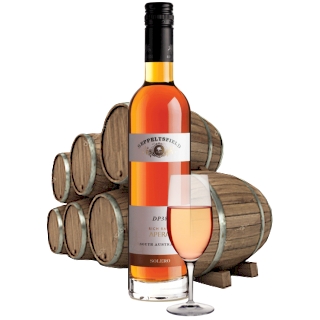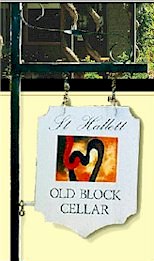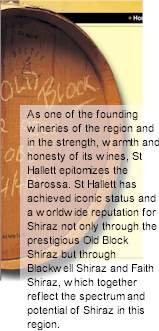


Evolution in the pursuit of excellence has been a consistent thread running through St Halletts history resulting in benchmark wines, recognised around the world as quintessential Barossa. As one of the founding wineries of the region and in the strength, warmth and honesty of its wines, St Hallett has come to be regarded as quintessential Barossa.

In the heart of the Barossa Valley, Australia's best known wine region, lies St Hallett, one of the country's premier wine producers. Established by the Lindner Family in 1944, for many years St Halletts winemaking focus was, like many local wineries, on producing fortified wines. However during the seventies and eighties St Hallett turned to explore the true potential of the Barossa through premium table wines. This has resulted in St Hallett's elevation as one of Australia?s best producers.
St Hallett is renowned for crafting full-flavored, textured wines entirely from Barossa Valley fruit and is credited with producing benchmark wines of the region such as the iconic St Hallett Old Block Shiraz, made from vines aged up to 100 years old. St Hallett's rich heritage and ongoing commitment to Barossa Shiraz is now underpinned by extensive experience and a continuous sense of evolution, attributes personified in winemakers Stuart Blackwell and Matt Gant.
Winemaker and General Manager, Stuart Blackwell spearheaded the commissioning of the new winemaking facilities in 1988 and the installation of some of the world's most advanced fruit processing and handling equipment. Despite this modern approach, traditional winemaking techniques prevail at St Hallett as best suited to the winery's classic style.

St Hallett's commitment to translating the tapestry of soils and meso-climates of the Barossa in each of its wines is made possible by the rich resource of old vines, long-term relationships with growers and the winemakers intuitive understanding of the Barossa.
As Senior Winemaker for over 30 years, Stuart Blackwell has developed a deep understanding of the rich tapestry of site and climatic variances in the Barossa and an appreciation of the importance of both dedicated growers and old vine Shiraz. Strong long-term relationships with focussed and passionate growers give St Hallett access to the Barossa's most prized old vine Shiraz vineyards dating back 60 to over 100 years of age. St Hallett also partners growers to nurture Shiraz on other sites which have unique qualities and comparable long-term potential.
Taking on the reins of evolution, Winemaker Matt Gant seeks to honour this patchwork of differences in vine age, climate and site, by avidly picking and keeping separate over 200 different parcels of Shiraz each vintage. Fermentation and most particularly maturation are then meticulously tailored to suit each parcel.
The diversity of these parcels allows the team to constantly evolve and adapt techniques not only from vintage to vintage but also parcel by parcel and is ultimately critical to the complexity and differentiation of St Hallett's three expressions of Barossa Shiraz, Faith, Blackwell and Old Block.
